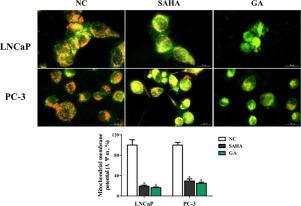The Journal of Nutritional Biochemistry ( IF 5.6 ) Pub Date : 2020-06-02 , DOI: 10.1016/j.jnutbio.2020.108444 Yin-Gi Jang 1 , Eul-Bee Ko 1 , Kyung-Chul Choi 1

|
Gallic acid (GA) is known to possess diverse biological activities, including anticancer. Histone deacetylase (HDACs) are controlled by tumor suppressor gene transcription and are overexpressed in various tumors, resulting in tumor development, progression and poor prognosis. This study aims to demonstrate the effect of GA on inhibition of prostate cancer (PCa) progression by modulating the expression of HDAC1 and 2 in PCa cells. To prove our research rationale, we used diverse experimental methods. GA decreased the cell viability of only PCa cell lines and not normal cells (contrary to another HDAC inhibitor, suberoylanilide hydroxamic acid) and also inhibited colony and tumor spheroid formation. Exposure to GA decreased the mitochondrial membrane potential (ΔΨm), increased the number of apoptotic cells and induced DNA fragmentation. Western blot analysis revealed down-regulated expression of HDAC1 and 2, leading to up-regulation of acetyl-p53 expression at the protein level, subsequent to down-regulating the expression of cell-cycle-related genes, i.e., proliferating cell nuclear antigen (PCNA), Cyclin D1 and E1, up-regulating the expression of cell cycle arrest gene p21 and regulating the expression of apoptosis intrinsic pathway-related genes, such as Bax, Bcl-2, cleaved Caspase-3 and poly (ADP-ribose) polymerase 1 in both PCa cell lines. Furthermore, oral administration of GA for 8 weeks on PC-3 cells-derived tumor xenograft mice model decreases the tumor size, damages the tumor structure and down-regulates the expression of HDAC1 and 2 and PCNA in tumor mass, as confirmed by histological analysis. These results indicated that GA may hinder the PCa progression by inhibiting HDAC1 and 2 expression, thereby demonstrating the potential of GA to be used as HDACs inhibitor and anti-PCa therapeutics.
中文翻译:

没食子酸(一种酚酸)通过抑制组蛋白脱乙酰基酶1和2的表达来阻止前列腺癌的发展。
没食子酸(GA)具有多种生物活性,包括抗癌剂。组蛋白脱乙酰基酶(HDACs)受肿瘤抑制基因转录控制,并在多种肿瘤中过度表达,导致肿瘤发展,进展和不良预后。这项研究旨在通过调节PCa细胞中HDAC1和2的表达来证明GA对前列腺癌(PCa)进展的抑制作用。为了证明我们的研究依据,我们使用了多种实验方法。GA降低了仅PCa细胞系的细胞活力,而没有降低正常细胞的细胞活力(与另一种HDAC抑制剂相反,亚磺酰苯胺异羟肟酸相反),并且还抑制了集落和肿瘤球体的形成。暴露于GA会降低线粒体膜电位(ΔΨm),增加凋亡细胞的数量并诱导DNA片段化。即,增殖细胞核抗原(PCNA),细胞周期蛋白D1和E1,上调细胞周期阻滞基因p21的表达并调节细胞凋亡内在途径相关基因的表达,例如Bax,Bcl-2,裂解的Caspase-3在两种PCa细胞系中都含有聚(ADP-核糖)聚合酶1。此外,通过组织学分析证实,在PC-3细胞衍生的异种移植小鼠模型上口服GA 8周可减小肿瘤大小,破坏肿瘤结构并下调肿瘤块中HDAC1和2和PCNA的表达。 。这些结果表明,GA可能通过抑制HDAC1和2的表达来阻碍PCa的进程,从而证明GA可用作HDACs抑制剂和抗PCa治疗剂的潜力。


























 京公网安备 11010802027423号
京公网安备 11010802027423号